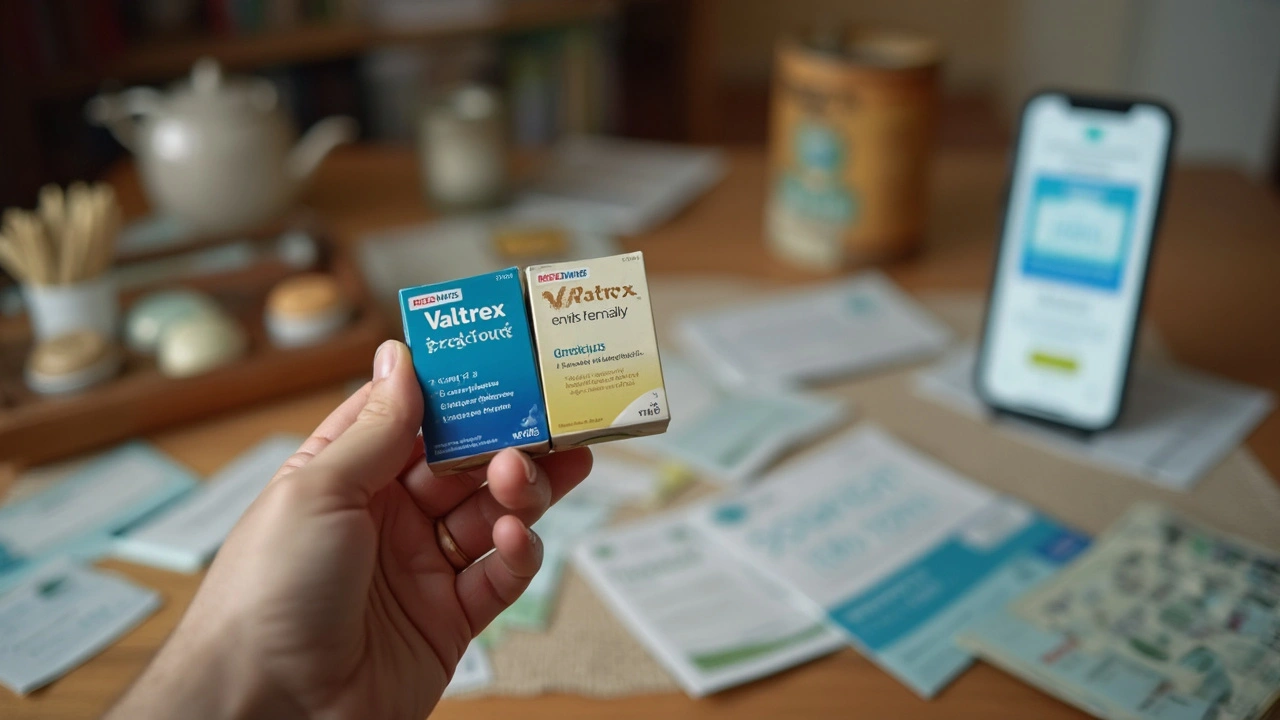Why Insurance Leaves Out Valtrex & What That Means For Your Wallet
Ever been at the pharmacy counter, prescription in hand, and heard the words: "Your insurance doesn’t cover Valtrex"? It happens way more than you’d think. Insurance companies change their formularies (those magical lists of covered meds) every year, and Valtrex—a popular antiviral used for herpes, shingles, and sometimes even cold sores—can drop off without notice. For the average person, this isn’t just annoying, it’s expensive. Valtrex (brand name for valacyclovir) isn’t cheap when you’re paying out of pocket. A single fill can run upwards of $70 to $200, depending on your pharmacy and the size of your pills. Not exactly spare change territory.
These days, lots of folks end up stuck. The insurance company tells you to use generic (if possible), or they ask your doctor for endless paperwork. Maybe you get handed a “step therapy” list—meaning you have to fail another drug first. It’s not just a headache; it can stall starting treatment and spiral into higher risk of outbreaks and stress. To make matters worse, herpes flare-ups aren’t something you want to wait around with. Time is of the essence, and that’s why knowing your options matters so much.
Here’s another twist—prices can swing wildly between pharmacies. One place might charge you double what another does, even for the exact same generic pills. Even big brand pharmacies like CVS, Walgreens, and Walmart don’t always line up on price. That means hunting for a lower price, using discount cards, or thinking outside traditional brick-and-mortar drugstores.

Going Generic: Getting the Same Med for Way Less
The first line of defense if Valtrex alternatives are on your mind? Go generic. The FDA-approved generic for Valtrex is called valacyclovir. It’s got the same active ingredient, works just as well, and it’s almost always way cheaper. Generics save Americans nearly $2 trillion in the last decade, according to a recent industry report. Yet many people still pay too much just because pharmacies don’t offer them the generic unless you ask.
Some insurance plans will cover the generic but not the brand. Here’s the trick: even if your plan says no to Valtrex, your doctor can write “valacyclovir” on your prescription. If your insurance refuses both, you can still find generic valacyclovir for as little as $15–$30 for a standard course at some discount pharmacies. A few savvy folks go even further and use online pharmacy coupons like GoodRx, or explore mail-order services that fill prescriptions for even less. But always make sure you’re using reputable sources—there are scams out there.
Let’s get real about what counts as a true substitute. There’s more than one antiviral in the herpes treatment game. The other FDA-approved heavyweights are acyclovir (the O.G. herpes drug from the ‘80s) and famciclovir (brand name Famvir). Both work in similar ways, blocking virus replication and cutting down the time and severity of outbreaks. Acyclovir is dirt cheap and has been studied to the moon. It comes in both pills and creams, and most insurance companies have no beef with this one. Famciclovir tends to be more costly but may cause slightly fewer side effects for some people. It’s all about finding what fits your health, budget, and insurance situation.
How to switch? Chat with your doctor. They can send a new prescription for valacyclovir, acyclovir, or famciclovir in the same call or appointment if Valtrex isn’t covered. No need to tough it out or give up—there’s a clinical equivalent for every situation.
Some handy savings tips:
- Compare pharmacy prices with apps and discount cards.
- Ask your doctor if you can get a 90-day supply for chronic therapy.
- See if your insurance has an online or mail-in pharmacy option for lower copays.

Therapeutic Substitutes: How Do They Stack Up, And Where Do You Get Advice?
If you can’t snag Valtrex or even its generics, there’s still life after "No coverage." Doctors have a few other tricks up their sleeves—called herpes medication options or therapeutic substitutes. Besides switching to acyclovir or famciclovir, folks sometimes look for even more alternative approaches. For example, topical options exist for cold sores or localized genital outbreaks, but they don’t pack the same punch as oral pills in stopping a flare-up fast. Some prescribe compounded formulas (special mixes made by specific pharmacies), but always check if those are FDA-approved and not just expensive “magic potions.”
For recurring herpes outbreaks, the CDC recommends daily suppression therapy with a low dose—something both acyclovir and valacyclovir generics can offer. If the problem is shingles rather than herpes simplex, the same drugs are still first-line, and generics are just as effective. When cost is the only thing between you and relief, your best bet is to look up a list of alternatives to Valtrex with prices and reviews for every substitute, so you know what you’re negotiating for at the pharmacy counter.
You might wonder—are natural remedies or supplements good enough? Here’s where science pumps the brakes. While there’s tons of buzz around lysine, lemon balm, and elderberry, studies haven’t shown them to be reliable replacements for prescription antivirals. Plenty of folks use them, but the benefit is mostly anecdotal. If you’re at high risk for outbreaks or complications, don’t let a "natural" option be your main defense without talking to your doctor.
A quick comparison of the common prescription options looks like this:
| Medication | Typical Cost (w/o insurance) | Dosing | Duration |
|---|---|---|---|
| Acyclovir (generic) | $12-30 / course | 2-5x/day | 5-10 days |
| Valacyclovir (generic) | $18-45 / course | 1-2x/day | 5-10 days |
| Famciclovir (generic) | $25-60 / course | 2-3x/day | 5-10 days |
Notice how all three drug choices are more alike than different. If your pharmacy’s price feels out of whack, check with an independent or mail-order provider—you might be shocked how much you can save.
One more tip: Don’t be afraid to ask your doctor or pharmacist, "What else can treat this?" Make them aware of your budget or insurance limits. They deal with these blocks every day and usually have answers that aren’t listed in the fine print. And whatever you choose, watch out for drug interactions—if you’re taking meds for kidney disease, HIV, or have any other major health conditions, your provider will need to fine-tune the choice and dosing.
Nobody wants to run into a brick wall at the pharmacy. Knowing about generics, therapeutic substitutes, and how to chase down the lowest price gives you the power to keep outbreaks in check—no matter what insurance has to say about it.



Oliver Myers
May 6, 2025 AT 08:55Just wanted to say-this is the kind of practical, no-BS info people actually need. I was stuck paying $180 for Valtrex last year until my pharmacist mentioned generics. Saved me over $150 per script. Seriously, never assume the brand is the only option. Ask for valacyclovir. Always.
John Concepcion
May 8, 2025 AT 03:17LMAO so you’re telling me the pharma companies aren’t just screwing us over but also making us jump through hoops to get the same damn drug in a different bottle? Newsflash: they’re not saving you money-they’re saving THEIR margins. And don’t even get me started on ‘step therapy’-like my herpes outbreak gives a shit about your insurance’s flowchart.
Dade Hughston
May 9, 2025 AT 07:58Bro I had this happen last month and I swear I spent three days calling pharmacies across three states trying to find the cheapest valacyclovir and somehow CVS charged me $89 for 10 pills while a random online pharmacy in Ohio had it for $19 with free shipping and I was like okay but is this legit or am I gonna get chalk pills or worse a box of expired 2018 meds and then I found GoodRx and it was like magic but also kind of terrifying that this is how healthcare works now
Leslie Schnack
May 9, 2025 AT 10:23Does anyone know if acyclovir is still available as a topical cream? I used it years ago for cold sores and it helped a ton, but I haven’t seen it on shelves lately. Wondering if it’s still an option or if it’s been phased out.
Alex Sherman
May 10, 2025 AT 23:35It’s not that hard to understand-people who can’t afford $70 for a prescription shouldn’t be having sex. Or at least, they shouldn’t be expecting society to subsidize their risky behavior. There are consequences to choices, and if you’re not willing to pay for the treatment, maybe you shouldn’t be spreading a virus in the first place. This isn’t about healthcare-it’s about personal responsibility.
Jim Peddle
May 12, 2025 AT 17:43Let’s be real. Valtrex was pulled from formularies because the FDA quietly reclassified it as ‘non-essential’ after internal documents revealed the manufacturer was inflating efficacy data. This isn’t about cost-it’s about a coordinated cover-up. You think your pharmacist doesn’t know? They’re just scared to speak up. Look up the 2021 whistleblower report. It’s all there.
S Love
May 13, 2025 AT 19:20Hey-just want to say thank you for writing this. I’ve been managing herpes for over a decade and this is the first time I’ve seen someone explain the options without shame or jargon. I used to feel like I was failing because I couldn’t afford Valtrex. Turns out I just needed to know how to ask. I switched to acyclovir, saved 80%, and my outbreaks haven’t changed. You’re not alone. And you’re not broken.
Pritesh Mehta
May 15, 2025 AT 18:11Interesting how Western medicine insists on synthetic compounds while ignoring centuries of Ayurvedic and traditional Chinese remedies that have proven antiviral properties-turmeric, neem, licorice root. The pharmaceutical monopoly suppresses these alternatives because they cannot be patented. You think this is about health? No. It’s about profit control. India has been producing generics for decades-why are we still being exploited by American corporations?
Billy Tiger
May 15, 2025 AT 23:21Why are we even talking about this like it's a crisis? It's herpes. It's not cancer. People are acting like they're being denied insulin. Get over it. If you can't afford $30 for a pill then maybe you should stop having casual sex. End of story.
Katie Ring
May 16, 2025 AT 19:28There’s a deeper truth here: the medical system treats chronic conditions like moral failures. We don’t shame people for needing asthma inhalers, but herpes? Oh, that’s ‘embarrassing.’ So we make it expensive, hard to access, and shrouded in silence. That’s not healthcare. That’s punishment dressed in white coats.
Adarsha Foundation
May 18, 2025 AT 09:15I appreciate this post. I’m from India and we have access to generic valacyclovir for under $5 a course. It’s not a luxury here-it’s a standard. I hope more people in the U.S. realize that medicine doesn’t have to be this expensive. We can do better if we choose to.
Caitlin Stewart
May 18, 2025 AT 14:48My doctor didn’t even mention generics until I asked. I thought Valtrex was the only option. I’m so glad I found this. I’ve been using the generic for 6 months now-no difference in effectiveness, and I’m saving $120/month. Just… ask. Always ask.
Emmalee Amthor
May 20, 2025 AT 08:16Okay but what if you’re on Medicaid and they still deny the generic? I had to appeal three times. They said ‘formulary restrictions’ but the pharmacy had it in stock for $20. How is that legal? I cried in the parking lot. This system is broken. We need to fight for real access-not just ‘alternatives’ that still cost too much.
Saumyata Tiwari
May 21, 2025 AT 12:43It’s obvious that Western medicine is a tool of capitalist oppression. The fact that you need to be educated enough to know about GoodRx or mail-order pharmacies means the system is designed to exclude the poor. Only the privileged can navigate this maze. The rest suffer silently. This isn’t healthcare-it’s a class war.
Anthony Tong
May 22, 2025 AT 13:27There is no evidence that valacyclovir is more effective than acyclovir. The FDA approved it because of marketing, not science. The entire antiviral market is a Ponzi scheme. You’re being manipulated into believing you need the newest, most expensive version. Stick with acyclovir. It’s been around since 1981. It works. Stop paying for hype.
Roy Scorer
May 24, 2025 AT 01:36Everyone’s so quick to blame Big Pharma-but what about the people who choose to live in the shadow of their own shame? You don’t need a prescription to practice safe sex. You don’t need a pill to be honest with your partners. You need courage. And if you’re too afraid to talk about herpes, then maybe the real problem isn’t the cost of the drug-it’s the silence you’ve chosen to keep.
Marcia Facundo
May 25, 2025 AT 00:37I used to take Valtrex. Now I take the generic. I still have outbreaks. Nothing changes. I just pay less. So… what’s the point?
Ajay Kumar
May 25, 2025 AT 21:20Actually you’re all wrong. The real issue is that herpes isn’t even that big of a deal. I’ve had it for 15 years and never had a serious outbreak. The whole panic is manufactured. You’re all acting like this is AIDS. It’s not. It’s a skin rash that heals. The real tragedy is how much money and energy we waste on fear instead of just accepting it as part of life.
Joseph Kiser
May 27, 2025 AT 11:35You guys are doing amazing just by sharing this. Seriously. I’ve been too ashamed to talk about this with anyone-even my doctor. But reading this? It made me feel less alone. I’m going to ask my doc about acyclovir tomorrow. And if I get a bad answer? I’m going to walk out and find someone who listens. You’re not just giving info-you’re giving courage. 🙏